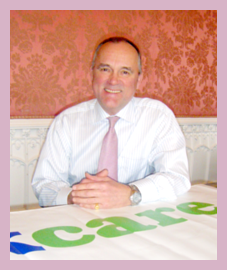 by Stuart Blackman, CEO of BackCare
by Stuart Blackman, CEO of BackCare
I am really enjoying working with BackCare as the new Chief Executive. We are at the cusp of a new phase of development of the charity. BackCare is the UK’s national back pain charity, founded 1968 – our mission is to turn the tide on back pain, the world’s leading cause of human disability. We do this through research, education and outreach initiatives.
Our new website is now the primary platform through which we can reach out to our key stakeholders: patients, clinicians, researchers, educators and our corporate supporters. We have used this time to re-envision how we see the charity moving forward.
The office represents the context in which many of us spend most of our waking lives. With a quarter of all days lost to sickness being due to musculoskeletal symptoms and with the dominant portion of these being back pain, there is a real obligation to lead the public health agenda into the office. In partnering with the like-minded organisations that comprise the ‘Active Working’ movement, we have opportunities to help spread awareness and advice on health and wellbeing at work.
 We are soon to re-launch our Teddington head office with the latest sit-stand desks and ergonomic chairs, serving our own staff as well as better allowing us to embody the message. For those interested in the Active Working concept see www.getbritainstanding.org.
We are soon to re-launch our Teddington head office with the latest sit-stand desks and ergonomic chairs, serving our own staff as well as better allowing us to embody the message. For those interested in the Active Working concept see www.getbritainstanding.org.
Unpaid carers now make up greater than 10% of the UK population, looking after a friend or family member with illness or disability. Carers are a particularly at-risk group due the unique physical and psychological factors involves, and often present to healthcare services as secondary patients. Through our research, education and outreach activities, BackCare is working to help prevent and manage back pain in unpaid carers. Unpaid carers save the nation a staggering £119 billion every year – that’s more than entire NHS budget. Replacing just one injured carer costs Social Services thousands of pounds. Prevention is now a legal obligation of Councils following the 2015 Carers Act (clause 2).
Following the Care Act we are in dialogue with Directors of Social Services, charities and other organisations responsible for identifying, assessing and supporting the 7 million unpaid/family carers across the UK. With 70% of unpaid carers already suffering from back pain, our publication (with CD) Carer’s Guide to safer moving and handling of people is designed to mitigate the physical risk factors and is based on HOP6 – the field leading national training text (as used to train UK nurses and paramedics – for more see www.backcare.org.uk/carers)
Back pain awareness week – we are talking with a number of organisations to create a compelling campaign focussing on back pain in children. This will focus on children at school and children who are carers, with a research driven radio day, campaign pack and nationwide community-level events.
My own background started with three leading healthcare companies in roles that included extensive clinical trials in the field of musculoskeletal disorders. I was able to build a strong foundation in the commercial disciplines and worked across Europe with experience in China as well. My career then developed into business development and change management consultancy to organisations from small to large. My passion for the Charity sector came out of my experience as Chairman for five years of a vocational training start-up in Birmingham supporting disaffected students back into productive learning to move them into employability. I realised the huge fulfilment I was feeling working for a “cause led” organisation and decided some ten years ago to move into the Charity sector full time.
To be at BackCare is remarkable as it brings me full circle to the medical field I started my career in. I feel well supported by the Board of Trustees as I seek to play my part with the team to realise “the potential of the potential” for BackCare and I must thank the staff and volunteers who are working so hard on this venture right now. It has also been really helpful in my own learning to be a part of ARMA – particularly to understand how this is a time of great opportunity for MSK, though we can’t be complacent. At BackCare we are very aware of the prevalence of back and neck pain and its debilitating effects – so to be involved with ARMA helps us feel supported and encouraged in our own cause.


